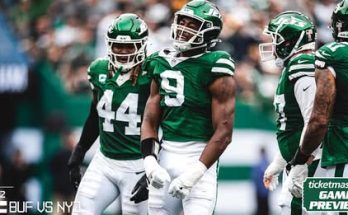Kalen DeBoer’s response after the 31-17 loss to Florida State was a mixture of disappointment, determination, and a clear vision for what he wants his team to become over the rest of the season. While many would be tempted to simply move on after a loss, DeBoer has openly embraced the idea that this defeat should be more than just a statistic in the record books—it should be a motivator, a fuel to channel the team’s energy, and a reminder of the work required to reach the program’s full potential.
The loss to FSU wasn’t just another game for DeBoer and his team; it was a moment of reckoning. Every coach experiences these types of games—matches where execution falters, mistakes are magnified, and the scoreboard reflects the cumulative missteps of preparation, strategy, and execution. For DeBoer, however, this game serves as an essential teaching moment. He recognizes that the emotions stemming from a tough defeat are a powerful tool if harnessed correctly. Instead of allowing frustration and disappointment to dominate, he wants his players to internalize the experience, learn from it, and carry the lessons forward.
What makes DeBoer’s approach particularly compelling is his emphasis on emotional intelligence and psychological resilience. Too often in sports, losses are viewed purely through a tactical lens—wrong plays, missed assignments, or insufficient talent. DeBoer understands that the mental aspect of football is just as critical. He wants his team to take the raw, uncomfortable feelings that come with losing and transform them into something productive. That means fostering a culture where players are honest about their mistakes but are equally committed to improvement. It’s about channeling the pain, rather than suppressing it, and turning that emotional energy into motivation.
For fans and observers, this is an important point. The narrative around a loss often centers on disappointment, but DeBoer reframes it as a moment of opportunity. By openly discussing the loss and what it revealed about his team, he demonstrates a transparency that encourages accountability. When players see their coach acknowledging both strengths and shortcomings, it reinforces the idea that growth requires reflection and effort. Fans can relate to this too—after all, everyone has experienced setbacks in their own lives. DeBoer’s message is universal: losses are not endpoints but catalysts for improvement.
DeBoer’s philosophy also emphasizes the importance of consistency. Football is a season-long journey, and one game—no matter how painful—does not define a team. The challenge lies in preventing one loss from derailing focus or morale. By channeling the pain of the FSU defeat, DeBoer is setting the stage for a team that is more disciplined, more focused, and more committed to the fundamentals. He wants players to carry the lessons of this game into every practice, every preparation session, and every matchup that follows. In essence, he is asking them to convert emotion into action, frustration into determination.
Another key element in DeBoer’s approach is the idea of collective responsibility. It’s easy for individual players to feel isolated after a loss or for fans to point fingers at a single aspect of the game. DeBoer pushes against that mentality. He frames the loss as a team-wide experience, emphasizing that each player contributes to both the successes and failures of the program. This approach not only fosters accountability but also unity. When the team collectively embraces the pain, they are more likely to work together to ensure it doesn’t happen again. This mindset strengthens bonds and builds resilience—qualities that are vital in a sport where pressure and adversity are constant.
Engaging with fans is another aspect where DeBoer’s philosophy becomes compelling. By sharing his vision for channeling the loss, he invites supporters to be part of the journey. Fans are not just observers; they are participants in the narrative. When they understand the coach’s perspective and see the team’s commitment to growth, they are more likely to engage—whether through discussions, social media commentary, or supporting the team at games. DeBoer’s openness encourages dialogue, prompting fans to reflect on the team’s development and contribute their own insights. In this sense, the loss to FSU transforms from a moment of disappointment into a conversation starter, a point of engagement, and a shared experience that connects players, coaches, and supporters alike.
From a strategic standpoint, DeBoer’s approach demonstrates forward-thinking leadership. He doesn’t dwell on the past in a way that is counterproductive, but he also doesn’t ignore the lessons embedded in the game. Every defeat is a data point, every mistake an opportunity to refine technique, and every emotional low a chance to strengthen mental fortitude. By framing the FSU loss as a catalyst rather than a setback, DeBoer models how adversity can be leveraged to drive long-term success. This is a critical lesson for players, fans, and even aspiring coaches who study his methodology: it’s not the loss itself that matters most, but how one responds to it.
Importantly, DeBoer also highlights the role of leadership within the team. Senior players, captains, and those with significant influence are encouraged to model resilience and set a tone that reflects the team’s values. When leaders embrace the pain constructively, it filters through the entire roster. Young players see firsthand how to respond with accountability and determination, which reinforces the culture DeBoer wants to cultivate. This kind of internal leadership is often what separates good teams from great ones. It ensures that the emotional energy generated by a tough loss is converted into tangible effort and improved performance.
DeBoer’s communication style in addressing this loss is noteworthy as well. He is candid without being critical, honest without being demoralizing. This balance is essential in maintaining morale while ensuring accountability. By framing the conversation around growth, he avoids the pitfalls of blame and negativity. Instead, he provides a roadmap for improvement that is both actionable and inspiring. Fans, too, can appreciate this approach—it reflects a commitment to integrity and development, rather than short-term results alone. This honesty invites engagement, sparking discussion about how the team can evolve, what strategies might change, and which players are stepping up to meet the challenge.
The broader lesson for the remainder of the season is that every game is interconnected. A single loss, while painful, becomes part of a narrative of growth, perseverance, and resilience. DeBoer wants his team to understand that each matchup is an opportunity to apply lessons learned, correct mistakes, and demonstrate progress. This mindset encourages players to approach each practice and game with heightened focus. Fans observing this process can see tangible improvement and become more invested in the journey, not just the outcome. It transforms the season into a story of development, making victories sweeter and losses more instructive.
From a fan engagement perspective, DeBoer’s philosophy offers multiple avenues for interaction. Supporters can share their own reflections on the FSU loss, speculate on adjustments, or celebrate the team’s response in subsequent games. By fostering a community around learning and growth, the conversation becomes dynamic and participatory. This is the type of engagement that extends beyond game day—fans feel connected to the team’s trajectory, contributing to a shared narrative that encompasses both triumphs and setbacks. Social media platforms, fan forums, and post-game discussions become spaces where supporters can engage meaningfully, inspired by DeBoer’s candid approach.
Finally, DeBoer’s focus on channeling the pain of a tough loss underscores a timeless truth in sports and life: growth often comes from discomfort. The 31-17 defeat to FSU may sting, but it also provides a template for resilience. By acknowledging the pain, analyzing the errors, and committing to improvement, the team transforms a negative experience into a positive force. For fans, this approach offers an example of how adversity can be leveraged for personal and collective development. It encourages reflection, dialogue, and engagement, all of which enrich the fan experience and deepen the connection to the team.
In conclusion, Kalen DeBoer’s response to the FSU loss reflects a philosophy that values resilience, accountability, and growth. By encouraging his team to channel the pain of defeat, he fosters a culture of learning, leadership, and forward momentum. This approach not only benefits the players but also invites fans to participate in the journey, sparking discussion, engagement, and shared reflection. The 31-17 loss becomes more than a score—it becomes a catalyst for improvement, a call to action, and a reminder that every setback is an opportunity to strengthen character and performance. As the season progresses, DeBoer’s vision will be tested, but it also provides a blueprint for how adversity, when approached with intention and focus, can propel a team toward its highest potential.
For readers, this is your moment to engage. Share your thoughts on how DeBoer’s philosophy might influence the team’s performance, debate the best ways to turn setbacks into victories, and reflect on the lessons that resonate most with you. The conversation doesn’t end on the field—it continues with every fan, every post, and every perspective that joins the dialogue. How do you think the team can use the FSU loss to fuel their journey for the rest of the season? Your insights matter, and your engagement contributes to the ongoing story of growth, resilience, and determination that Kalen DeBoer is building.



